- Home
- Nicholas Sparks
Nights in Rodanthe Page 5
Nights in Rodanthe Read online
Page 5
"Thanks."
She paused, her mind searching for anything else to say.
"Oh, one more thing. Before you use the phone, you should know it's only set up to make local calls. If you want to dial long distance, you'll have to use a calling card or call collect, and you'll have to go through the operator."
"Okay."
She hesitated in the doorway. "Anything else you need to know?"
"I think that just about covers it. Except, of course, for the obvious."
"What's that?"
"You haven't told me your name yet."
She set the key on the chest of drawers beside the door and smiled. "I'm Adrienne. Adrienne Willis."
Paul crossed the room, and surprising her, he offered his hand.
"Nice to meet you, Adrienne."
Six
Paul had come to Rodanthe at the request of Robert Torrelson, and as he unpacked a few items from the duffel bag and placed them in the drawers, he wondered again what Robert wanted to say to him or if he expected Paul to do most of the talking.
Jill Torrelson had come to him because she had a meningioma. A benign cyst, it wasn't a life-threatening ailment, but it was unsightly, to say the least. The meningioma was on the right side of her face, extending from the bridge of her nose and over the cheek, forming a bulbous purple mass, punctuated by scars where it had ulcerated over the years. Paul had operated on dozens of patients with meningiomas, and he'd received many letters from those who had undergone the operation, expressing how thankful they were for what he'd done.
He'd gone over it a thousand times, and he still didn't know why she'd died. Nor, it seemed, could science provide the answer. The autopsy on Jill was inconclusive, and the cause of death had not been determined. At first, they assumed she'd had an embolism of some sort, but they could find no evidence of it. After that, they focused on the idea that she'd had an allergic reaction to the anesthesia or postsurgical medication, but those were eventually ruled out as well. So was negligence on Paul's part; the surgery had gone off without a hitch, and a close examination by the coroner had found nothing out of the ordinary with the procedure or anything that might have been even tangentially responsible for her death.
The videotape had confirmed it. Because the meningioma was considered typical, the procedure had been videotaped by the hospital for potential use in instruction by the faculty. Afterward, it had been reviewed by the surgical board of the hospital and three additional surgeons from out of state. Again, nothing was found to be amiss.
There were some medical conditions mentioned in the report. Jill Torrelson was overweight and her arteries had thickened; in time, she may have needed a coronary bypass. She had diabetes and, as a lifelong smoker, the beginnings of emphysema, though again, neither of these conditions seemed life-threatening at present, and neither adequately explained what had happened.
Jill Torrelson, it seemed, had died for no reason at all, as if God had simply called her home.
Like so many others in his situation, Robert Torrelson had filed a wrongful-death suit. The lawsuit named Paul, the hospital, and the anesthesiologist as defendants. Paul, like most surgeons, was covered by malpractice insurance. As was customary, he was instructed not to speak to Robert Torrelson without an attorney present and even then only if he was being deposed and Robert Torrelson happened to be in the room.
The case had gone nowhere for a year. Once Robert Torrelson's attorney received the autopsy report, had another surgeon review the videotape, and the attorneys from the insurance company and hospital started the process of filing motions to drag out the process and run up the costs, he'd painted a bleak picture of what his client was up against. Though they didn't say so directly, the attorneys for the insurance company expected Robert Torrelson to eventually drop the suit.
It was like the few other cases that had been filed against Paul Flanner over the years, except for the fact that Paul had received a personal note from Robert Torrelson two months ago.
He didn't need to bring it with him to recall what had been written.
Dear Dr. Flanner,
I would like to talk to you in person. This is very important to me.
Please.
Robert Torrelson
At the bottom of the letter, he'd left his address.
After reading it, Paul had showed it to the attorneys, and they'd urged him to ignore it. So had his former colleagues at the hospital. Just let it go, they'd said. Once this is over, we can set up a meeting with him if he still wants to talk.
But there was something in the simple plea above Robert Torrelson's neatly scrawled signature that had gotten to Paul, and he'd decided not to listen to them.
To his mind, he'd ignored too many things already.
Paul put on his jacket, walked down the steps, and went out the front door, heading toward the car. From the front seat, he grabbed the leather pouch containing his passport and tickets, but instead of going back inside, he made his way around the side of the house.
On the beach side the wind grew cold, and Paul paused for a moment to zip his jacket. Pinching the leather pouch beneath his arm, he tucked his hands into his jacket and bowed his head, feeling the breeze nip at his cheeks.
The sky reminded him of those he'd seen in Baltimore before snowstorms that tinted the world into shades of washed-out gray. In the distance, he could see a pelican gliding low over the water, its wings unmoving, floating with the wind. He wondered where it would go when the storm hit full force.
Near the water, Paul stopped. The waves were rolling in from two different directions, sending up plumes as they collided. The air was moist and chilly. Glancing over his shoulder, he saw the light in the kitchen of the Inn glowing yellow. Adrienne's figure passed shadowlike by the window, then vanished from sight.
He would try to talk to Robert Torrelson tomorrow morning, he thought. The storm was expected to arrive in the afternoon and would probably last through most of the weekend, so he couldn't do it then. Nor did he want to wait until Monday; his flight left on Tuesday afternoon out of Dulles, and he had to leave Rodanthe no later than nine. He didn't want to run the risk of not speaking with him, and in light of the storm, one day was cutting it close. By Monday, power lines might be down, there might be flooding, or Robert Torrelson might be taking care of who knew what in the aftermath.
Paul had never been in Rodanthe before, but he didn't think it would take more than a few minutes to find the house. The town, he figured, had no more than a few dozen streets, and he could walk the length of the town in less than half an hour.
After a few minutes on the sand, Paul turned and started making his way back toward the Inn. As he did, he caught a glimpse of Adrienne Willis in the window again.
Her smile, he thought. He liked her smile.
From the window, Adrienne found herself glancing at Paul Flanner as he made his way back from the beach.
She was unpacking the groceries, doing her best to put them in the right cupboards. Earlier in the afternoon, she'd bought the items that Jean had recommended, but now she wondered if she should have waited until Paul arrived to ask him if there was anything in particular that he wanted to eat.
His visit intrigued her. She knew from Jean that when he'd called six weeks ago, she'd said that she closed up after the New Year and wouldn't open again until April; but he'd offered to pay double the room rate if she could stay open an extra week.
He wasn't on vacation, she was sure of that. Not only because Rodanthe wasn't a popular destination in winter, but because he didn't strike her as the vacationing type. Nor was his demeanor when he'd checked in that of someone who'd come here to relax.
He hadn't mentioned that he was visiting family, either, so that meant he was probably here for business. But that, too, didn't make much sense. Other than fishing and tourism, there wasn't much business in Rodanthe, and with the exception of those businesses that provided the necessities for those who lived here, most of them closed down for th
e winter anyway.
She was still trying to figure it out when she heard him coming up the back steps. She listened as he stomped the sand from his feet outside the door.
A moment later, the back door opened with a squeak, and Paul walked into the kitchen. As he shrugged off his jacket, she noticed that the tip of his nose had turned red.
"I think the storm's getting close," he said. "The temperature's dropped at least ten degrees since this morning."
Adrienne put a box of croutons into the cupboard and looked over her shoulder as she answered.
"I know. I had to turn the heater up. This isn't the most energy efficient of homes. I could actually feel the wind coming in through the windows. Sorry you don't have better weather."
Paul rubbed his arms. "That's the way it goes. Is the coffee still out? I think I could use a cup to warm up."
"It might be a little stale by now. I'll make a fresh pot. It'll only take a few minutes."
"You wouldn't mind?"
"Not at all. I think I could use one, too."
"Thank you. Just let me put my jacket in my room and clean up, and I'll be right back down."
He smiled at her before he left the kitchen, and Adrienne felt herself exhale, unaware she'd been holding her breath. In his absence, she ground a handful of fresh beans, changed the filter, and started the coffee. She retrieved the silver pot, poured the contents down the sink, and rinsed it out. As she worked, she could hear him moving in the room above her.
Though she'd known in advance that he would be the only guest this weekend, she hadn't realized how strange it would seem to be alone in the house with him. Or alone, period. Sure, the kids had their own activities and she had a little time to herself now and then, but it was never for long. They could pop back in at any moment. Besides, they were family. It wasn't quite the same as the situation she was in now, and she couldn't escape the feeling that she was living someone else's life, one in which she wasn't exactly sure of the rules.
She made a cup of coffee for herself and poured the rest into the silver pot. She was putting the pot back on the tray in the sitting room when she heard him coming down the stairs.
"Just in time," she said. "Coffee's ready. Would you like me to get the fire going?"
As Paul entered the sitting room, she caught a trace of cologne. He reached around her for a cup.
"No, that's okay. I'm comfortable. Maybe later."
She nodded and took a small step backward. "Well, if you need anything, I'll be in the kitchen."
"I thought you said you wanted a cup."
"I already poured one. I left it on the counter."
He looked up. "You're not going to join me?"
There was something expectant in the way he asked, as if he really wanted her to stay.
She hesitated. Jean was good at making small talk with strangers, but she never had been. At the same time, she was flattered by his offer, though she wasn't sure why.
"I suppose I could," she finally said. "Just let me get my cup."
By the time she'd returned, Paul was sitting in one of the two glider rockers near the fireplace. With black-and-white photographs along the wall that depicted life in the Outer Banks during the 1920s and a long shelf of thumbed-through books, this had always been her favorite room in the Inn. There were two windows along the far wall that looked to the ocean. A small stack of cordwood was piled near the fireplace along with a container of kindling, as if promising a cozy evening with family.
Paul was holding his cup of coffee in his lap, rocking back and forth, taking in the view. The wind was making the sand blow, and the fog was rolling in, giving the world outside an illusion of dusk. Adrienne sat in the chair next to his and for a moment watched the scene in silence, trying not to feel nervous.
Paul turned toward her. "Do you think the storm's going to blow us away tomorrow?" he asked.
Adrienne ran her hand through her hair. "I doubt it. This place has been here for sixty years, and it hasn't blown away yet."
"Have you ever been here during a nor'easter? A big one, I mean, like the one they're expecting?"
"No. But Jean has, so it can't be too bad. But then again, she's from here, so maybe she's used to it."
As she answered, Paul found himself evaluating her. Younger by a few years than he was, with light brown hair cut just above the shoulder blades and curled slightly. She wasn't thin, but she wasn't heavy, either; to him, her figure was inviting in a way that defied the unrealistic standards of television or magazines. She had a slight bump on her nose, crow's-feet around her eyes, and her skin had reached that soft point in between youth and age, before gravity began to take its toll.
"And you said she's a friend?"
"We met in college years ago. Jean was one of my roommates, and we've kept in touch ever since. This used to be her grandparents' house, but her parents converted it to an inn. After you made arrangements with her to stay, she called me, since she had an out-of-town wedding to attend."
"But you don't live here?"
"No, I live in Rocky Mount. Have you ever been there?"
"Many times. I used to pass through on trips to Greenville."
At his answer, Adrienne wondered again about the address he'd listed on the registration form. She took a sip of coffee and lowered the cup to her lap.
"I know it's none of my business," she said, "but can I ask what you're doing here? You don't have to answer if you don't want--I'm just curious."
Paul shifted in his chair. "I'm here to talk to someone."
"That's a long way to drive to have a conversation."
"I didn't have much of a choice. He wanted to meet in person."
His voice sounded tight and remote, and for a moment, he seemed lost in thought. In the silence, Adrienne could hear the whipping of the flag out front.
Paul set his coffee on the table between them.
"What do you do?" he finally asked, his voice warming again. "Besides watching bed-and-breakfasts for friends?"
"I work in the public library."
"You do?"
"You sound surprised."
"I guess I am. I expected you to say something different."
"Like what?"
"To be honest, I'm not sure. Just not that. You don't look old enough to be a librarian. Where I live, they're all in their sixties."
She smiled. "It's only part-time. I have three kids, so I do the mom thing, too."
"How old are they?"
"Eighteen, seventeen, and fifteen."
"Do they keep you busy?"
"No, not really. As long as I'm up by five and don't go to bed until midnight, it's not too bad."
He chuckled under his breath, and Adrienne felt herself beginning to relax. "How about you? Do you have children?"
"Just one. A son." For a moment his eyes dropped, but he came back to her again. "He's a doctor in Ecuador."
"He lives there?"
"For the time being. He's volunteering his services for a couple of years at a clinic near Esmeraldas."
"You must be proud of him."
"I am." He paused. "But to be honest, he must have gotten that from my wife. Or rather, my ex-wife. It was more her doing than mine."
Adrienne smiled. "That's nice to hear."
"What?"
"That you still appreciate her good qualities. Even though you're divorced, I mean. I don't hear a lot of people saying those things after they split up. Usually, when people talk about their exes, all they bring up are the things that went wrong or the bad things the other person did."
Paul wondered if she was speaking from personal experience, guessing that she was.
"Tell me about your kids, Adrienne. What do they like to do?"
Adrienne took another sip of her coffee, thinking how odd it was to hear him saying her name.
"My kids? Oh, well, let's see... Matt was the starting quarterback on the football team, and now he's playing guard on the basketball team. Amanda loves drama, and she just won th
e lead to play Maria in West Side Story. And Dan... well, right now, Dan is playing basketball, too, but next year, he thinks he might go out for wrestling instead. The coach has been begging him to try out since he saw him at sports camp last summer."
Paul raised his eyebrows. "Impressive."
"What can I say? It was all their mother's doing," she quipped.
"Why does that not surprise me?"
She smiled. "Of course, those are just their good parts. Had I told you about their mood swings or their attitudes, or let you see their messy rooms, you'd probably think I was doing a terrible job raising them."
Paul smiled. "I doubt it. What I'd think is that you were raising teenagers."
"In other words, you're telling me that your son, the conscientious doctor, went through all this, too, so I shouldn't lose hope?"
"I'm sure he did."
"You don't know for sure, though?"
"Not really." He paused. "I wasn't around as much as I should have been. There was a time in my life when I used to work too much."
She could tell it was a difficult admission for him, and she wondered why he'd said it. Before she could dwell on it, the phone rang and they both turned at the sound.
"Excuse me," she said, rising from her seat. "I have to get that."
Paul watched her walk away, noticing again how attractive she was. In spite of the direction his medical practice had taken in later years, he'd always remained less interested in appearance than those things a person couldn't see: kindness and integrity, humor and sensibility. Adrienne, he was sure, had all those traits, but he got the feeling that they'd been unappreciated for a long time, maybe even by her.
He could tell that she had been nervous when she first sat down, and he found that oddly endearing. Too often, especially in his line of work, people seemed intent on trying to impress, making sure they said the right things, showcasing those things they did well. Others rambled on, as if they viewed conversation as a one-way street, and nothing was more boring than a blowhard. None of those traits seemed to apply to Adrienne.
And, he had to admit, it was nice to talk to someone who didn't know him. During the past few months, he'd alternated between spending time alone or fending off questions as to whether or not he was feeling okay. More than once, colleagues had recommended the name of a good therapist and confided that the person had helped them. Paul had grown tired of explaining that he knew what he was doing and that he was sure of his decision. And he was even more tired of the looks of concern they offered in response.

 The Notebook
The Notebook Two by Two
Two by Two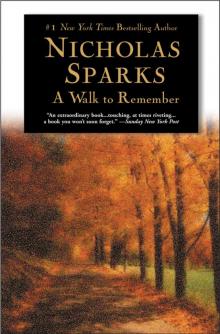 A Walk to Remember
A Walk to Remember The Guardian
The Guardian Dear John
Dear John The Last Song
The Last Song The Lucky One
The Lucky One The Wedding
The Wedding The Longest Ride
The Longest Ride Safe Haven
Safe Haven The Rescue
The Rescue The Wish
The Wish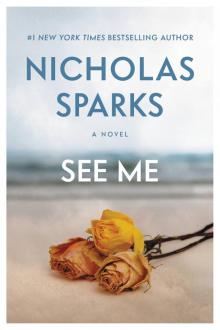 See Me
See Me Message in a Bottle
Message in a Bottle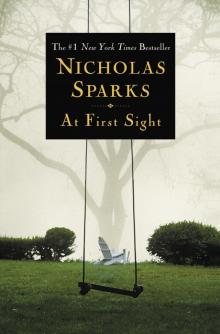 At First Sight
At First Sight True Believer
True Believer The Return
The Return A Bend in the Road
A Bend in the Road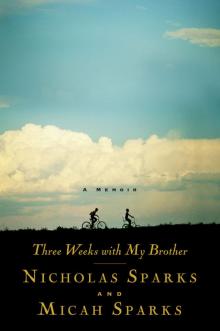 Three Weeks With My Brother
Three Weeks With My Brother Nights in Rodanthe
Nights in Rodanthe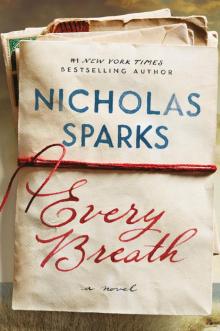 Every Breath
Every Breath